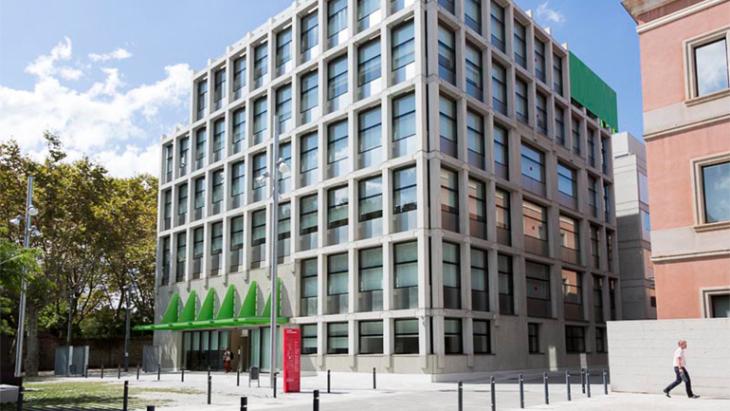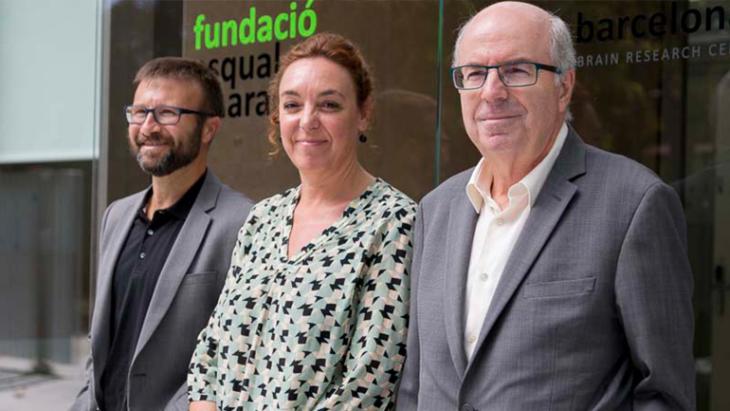14 Sep | 2016
Launching of the Barcelonaßeta Brain Research Center, a pioneering hub for research into Alzheimer’s disease

New building of Pasqual Maragall Foundation

New building of Pasqual Maragall Foundation
This year we have taken one step further in our fight against Alzheimer’s disease with the launch of Barcelonaßeta Brain Research Center (BBRC). This innovative research complex will boast cutting-edge facilities specifically developed for clinical research into Alzheimer’s disease prevention. This will be the site of Pasqual Maragall Foundation’s new headquarters, unifying all of its scientific activity under one roof, offering researchers and collaborators facilities that have been specifically designed to house brain studies and service the needs of research in this field.
The new building is located on Calle Wellington in Barcelona, part of the Ciutadella Campus of the Universidad Pompeu Fabra. It was designed by architect Juan Navarro Baldeweg, recipient of the 2014 Spanish National Architecture Award. The headquarters boasts 4,276 m2 of space, divided into 6 above-ground floors, and one basement level. The Foundation is currently conducting a number of research programs into Alzheimer’s prevention on four of the building’s floors, such as Alfa Study and the European EPAD project. The three remaining floors are available for future growth of the Foundation, and will be occupied in keeping with the needs of future scientific projects.
The Center’s Clinical Research Program, which currently runs the Alfa Study and the European EPAD initiative, has seven research offices for receiving volunteers and collection of research data, a lab for the handling of biological samples as well as a sample storage room with refrigerators. The Therapeutic Group Program for caregivers will have its own room for group therapy sessions for persons who are taking care of patients with Alzheimer’s disease; the aim being to provide them with the support they need to improve their quality of life.
The center also boasts a Neuroimaging Platform that offers medical imaging services with research staff who are specialized in post-processing and analysis of images in the field of neuroscience research. This is an important improvement over conventional magnetic resonance imaging units, which are often shared among a number of medical specialties, and whose clinical and research staff come from various fields. The platform has a state-of-the-art 3T magnetic resonance scanner that will be used for obtaining high-quality brain images. This will allow us to deepen our knowledge on how the brain works, understand neurodegeneration, and see the effects of preventative treatments on patients. Scientific support is also provided by Philips, the technology company that manufactured the unit. The Foundation’s offices will be located on the fourth floor. It is here where the organization will carry out its fund-raising, communication and administrative activities.
A total of 53 employees will work here, with the research staff of Barcelonaβeta Brain Research Center accounting for more than half. Its current facilities will allow them to receive and carry out testing for nearly 3,000 volunteers who are participating in the various studies.
Budget
A total of €9 million has been invested in the construction, facilities and associated civil works, with €2.9 million used in the purchase of research equipment. A quarter (25%) has been provided using the foundation’s own funds (private funds raised as part of the 2011 International Alzheimer’s initiative, promoted with the support of the Fundación Reina Sofia) and the remainder coming from an interest-free loan granted by the Spanish Ministry of Health, Social Services and Equality. In addition, the foundation has also received a ERDF 2014-2020 grant (European Regional Development Fund, Resolution ECO/1823) totalling €2.5 million, administered by the Autonomous Government of Catalonia.









